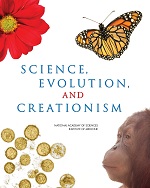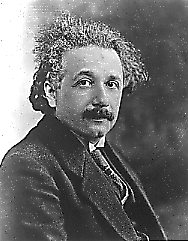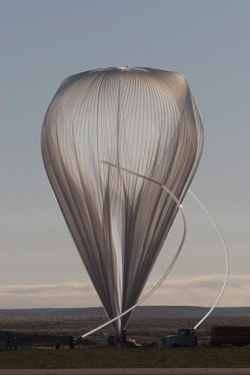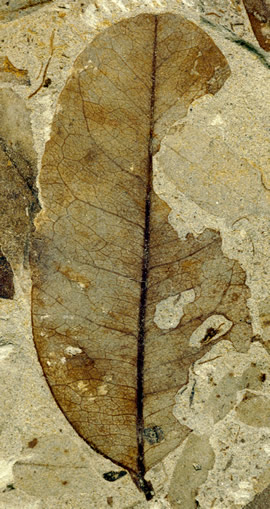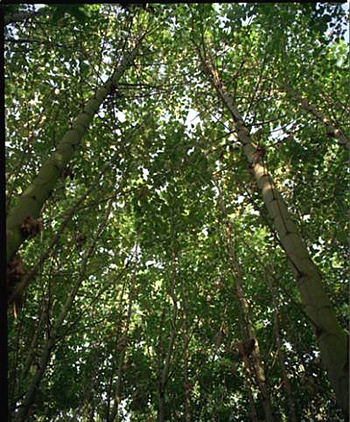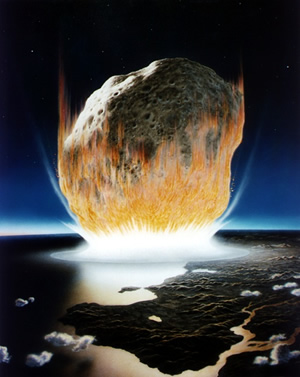Videos from the National Science Foundation
Check out this collection of videos from the National Science Foundation (NSF) covering a broad range of scientific topics!
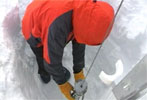 |
Ice Cores for Studying Past ClimateClimate scientists use ice cores from glaciers and ice caps to learn about climates of the past. |
Length: 2 min. 11 sec. Date: March 23, 2010 |
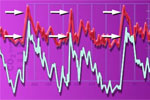 |
Past Matching of Global Temperature and CO2 LevelsClimate records from the past show that changes in temperature and changes in atmospheric carbon dioxide go hand-in-hand. |
Length: 31 sec. Date: March 23, 2010 |
 |
Proxy Records of Past ClimateClimate scientists use various "proxy" records to learn about climates in prehistoric times. |
Length: 4 min. 38 sec. Date: March 23, 2010 |
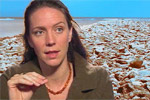 |
Coral for Studying Past ClimateClimate scientists use cores drilled from coral colonies to learn about climates of the past. |
Length: 1 min. 7 sec. Date: March 23, 2010 |
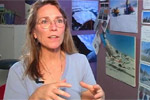 |
Study Past Climate to Predict FutureScientists study past climates to help make better predictions about future climate change. |
Length: 1 min. 38 sec. Date: March 23, 2010 |
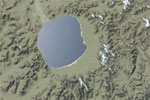 |
Lake-bottom Sediments for Studying Past ClimateClimate scientists study layers of sediments from the bottoms of lakes to learn about climates of the past. |
Length: 55 sec. Date: March 23, 2010 |
 |
Past Climate Changes and UncertaintyClimate scientists use "fuzzy" proxy records to learn about climates of the past. |
Length: 1 min. 46 sec. Date: March 23, 2010 |
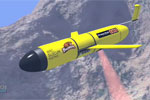 |
Exploring Ocean Dead ZonesOceanographers are using robotic undersea "gliders" to study "dead zones" in the seas. |
Length: 2 min. 33 sec. Date: November 19, 2009 |
 |
Amphibians Are DyingDisease, pollution, and habitat loss are killing off many of the world's amphibians. |
Length: 5 min. 4 sec. Date: November 4, 2009 |
 |
Earthquake TestingScientists are using the world's largest "shake table" to test new construction methods for buildings in areas prone to earthquakes. |
Length: 4 min. 54 sec. Date: September 28, 2009 |
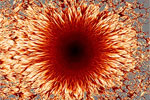 |
Modeling SunspotsSupercomputer models are helping solar scientists develop a better understanding of sunspots. |
Length: 4 min. 56 sec. Date:September 16, 2009 |
 |
Secrets of Plant Genomes Revealed!This lively look at the field of plant genetics explores how plants got to be the way they are and ways science may help us make better use of plants in the future. |
Length: 24 minutes Date: August 31, 2007 |
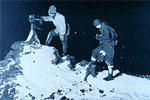 |
The History of Early Polar ExplorationThis talk by Donal Manahan of the University of Southern California describes scientific aspects of early polar exploration. |
Length: 11 min. 48 sec. Date: August 30, 2007 |
 |
Star Wars: Where Science Meets Imagination - Museum ExhibitThis museum exhibit explores the science behind the "Star Wars" movies. Want to learn more? Check out this Press Release. |
Length: 1 min. 46 sec. Date: April 24, 2007 |
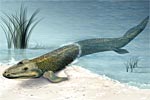 |
Evolution Hits the BeachA lively, informal look at a fossil that may represent the first vertebrate to emerge from the ancient seas, discovered by scientists from the University of Chicago, Harvard University and the Academy of Natural Sciences in Philadelphia. |
Length: 1 min. 7 sec. Date: November 2, 2006 |
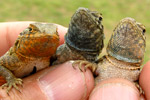 |
Genetics of Self-SacrificeA lively, informal look at animal research by scientists from UC-Santa Cruz. They studied a common lizard species and found that slight genetic variations (as revealed by different throat colors) make a big difference in behavior. |
Length: 1 min. 19 sec. Date: November 2, 2006 |
 |
Making Earthquakes... IndoorsA lively, informal look at earthquake research conducted by NSF's NEESWood project, featuring a full-size, three-bedroom house built on an indoor "shake table" at the State University of New York at Buffalo. |
Length: 1 min. 6 sec. Date: November 2, 2006 |
 |
Nature's Strongest Glue?Scientists study superglue made by microbes to see if we can learn their tricks. But is this superglue strong enough to hold up an elephant? |
Length: 51 seconds Date: November 2, 2006 |
 |
Reusing ForestsScientists work to convert scrap wood left over from making paper into useful products. Forest biorefineries may someday produce ethanol for fuel or polymers for plastics. |
Length: 53 seconds Date: November 2, 2006 |
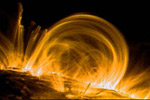 |
Stormy Weather on the Sun?A lively, informal look at solar research describes a worrisome new set of predictions for the upcoming sunspot cycle issued by scientists at the National Center for Atmospheric Research. |
Length: 58 seconds Date: November 2, 2006 |
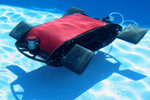 |
Teaching Robots to SwimRobotic submarines help scientists learn how marine animals swim and help engineers design better underwater vehicles. |
Length: 1 min. 26 sec. |
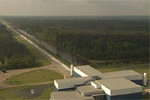 |
Einstein's Messengers - LIGO DocumentaryAstronomers hope to reveal the answers to some cosmic questions about the formation and early history of the universe with LIGO - NSF's Laser Interferometer Gravitational Wave Observatory. |
Length: 20 min. 12 sec. Date: June 1, 2006 |
 |
The History of the Universe in 60 Seconds or Less - Dr. Eric SchulmanThe universe is a big place with a long history. Dr. Eric Schulman brings it down to size in The History of the Universe in 60 Seconds or Less. Granted, he does a little abridging here and there, but basically he's got it right. Join Dr. Schulman for this whirlwind history lesson...and don't blink. |
Length: 1 min. 16 sec. Date: December 15, 2005 |
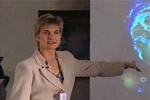 |
GeoClimate: Probing Earth's Deep-Time Climate ArchivesScientists are working to gain a "deep time" perspective on climate change to better understand how Earth's climate has evolved over long periods of time. They hope this perspective will help them gain insights useful for predicting future climate change. |
Length: 23 min. 14 sec. Date: November 16, 2005 |
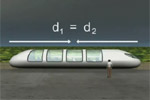 |
Einstein's Theory of Relativity - SimultaneityAlbert Einstein's theory of relativity makes some pretty strange predictions. This movie explains how two observers can disagree as to whether events happen at the same time - and both be right! |
Length: 1 min. 53 sec. Date: October 18, 2005 |
 |
Einstein's Theory of Relativity - Time DilationAlbert Einstein's theory of relativity makes some pretty strange predictions. This movie explains how time can slow down when you are moving very, very fast! |
Length: 1 min. 12 sec. Date: October 18, 2005 |
 |
Highlighting the WTEC International Study of RoboticsCheck out recent developments from the world of robotics reported in the World Technology Evaluation Center (WTEC) International Study of Robotics. |
Length: 37 min. 55 sec. Date: September 16, 2005 |
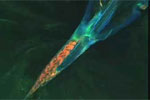 |
Science and Engineering Visualization ChallengeThe Science and Engineering Visualization Challenge recognizes and encourages visualization in the communication of science. Check out these stunning images and astonishing animations. |
Length: 29 min. 26 sec. Date: July 19, 2005 |
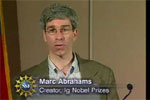 |
Improbable Research - the Ignoble PrizeMarc Abrahams, editor and co-founder of the science humor magazine Annals of Improbable Research and father of the Ig Nobel Prize Ceremony, shows us how science can make you laugh and make you think. |
Length: 55 min. 3 sec. Date: April 30, 2004 |
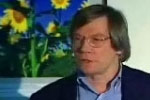 |
Cosmic Inflation and the Accelerating UniverseDr. Alan Guth describes the theory of cosmic inflation which claims that the expansion of the Universe is accelerating. |
Length: 1 hr. 1 min. 59 sec. Date: October 20, 2003 |





